Week 33: Nutcracker Buck Sings “Lego Town”
That’s satire or something, I guess.
I remember when that song was called “Yahtzee!” But I guess there’s room enough in a 50-song career for two songs about resolving domestic crises through kids’ toys and games.
I’ve been hanging on to this one for awhile because I thought it was a good candidate for a full-blown studio production. It’s not a terribly good song—”Yahtzee” is better—but I thought it could sound pretty good, and it has a solid enough beat that I thought I could find some drum loops that would fit. But, alas, the song defeated me. The beat changes on the bridge, and I couldn’t figure out how to splice in a new drum loop and make it sound . . . good. So, still no drums. I should have stuck with an acoustic-only version. The present offering is a big mess, especially at the end, where I stopped even pretending I could play the bass. And it’s a good illustration of the rule that you should probably get each successive guitar part right before stacking up the next one.
Video. The video has nothing whatsoever to do with the song or with Legos. I just wanted to use the fresh video before it got unwieldy. The tour of places I lived in Austin is not complete; it covers only the places I lived in Hyde Park and on West Campus. I was too lazy to drive over on East 38th and get a shot of the infamous Mineshaft, the place I lived for about six months in 1993 that I always described as being an apartment under a garage apartment, because that’s what it was. The neighbors there got mad at me because (they claimed) I screwed up their compost pile. How do you screw up a compost pile? Well, back then I considered beans vegetarian even if they were cooked with Italian sausage. That’s probably how.
Ten Books I’ve Read at least Six Times. Here are ten books that I have read at least six times, in the order (roughly) that I first read them, with a few words about each, all of the foregoing for no reason in particular.
1. Stuart Little by E.B. White. 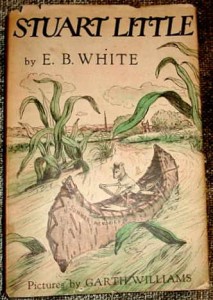 This is the saddest, funniest, sweetest novel I have read, whose breadth and depth of influence on me is rivaled only by The Moviegoer (see below). I read it first when I was seven years old and have never really stopped reading it since (it has the distinction on this list as being both the earliest and the latest of the books I’ve read, since I am usually reading it to one of the kids these days. They love the sailboat race. So do I.) My original copy was a paperback ordered from Weekly Reader, later given to my stepsister, ten years younger than me, though I don’t think she really got into it, or if she did I never heard about it. She was more into New Kids on the Block back then.
This is the saddest, funniest, sweetest novel I have read, whose breadth and depth of influence on me is rivaled only by The Moviegoer (see below). I read it first when I was seven years old and have never really stopped reading it since (it has the distinction on this list as being both the earliest and the latest of the books I’ve read, since I am usually reading it to one of the kids these days. They love the sailboat race. So do I.) My original copy was a paperback ordered from Weekly Reader, later given to my stepsister, ten years younger than me, though I don’t think she really got into it, or if she did I never heard about it. She was more into New Kids on the Block back then.
It was the first chapter book I read by myself (I think). We had a pickup with a camper-shell, which was just that: a shell. It fit down over the bed of the pickup behind the cab, and the camper-shell had a little wood-paneled cubby hole at the front, just big enough for a boy to lie down in. I finished the book lying in that camper-shell, smelling that wood paneling, on a dusky fall evening, in our pickup parked in front of the house we lived in on a dirt road four miles north of Loving. I remember reading that last page, in which the telephone-pole-climbing repairman wishes Stuart good luck (“And I hope you find that bird”), just as the light got too dim to make out the words on the page, and feeling like I’d never be the same, and I wasn’t, and I’m not.
2. Rutgers and the Watersnouts by Barbara Dana. I read a lot as a kid. It’s strange to me that I can remember only a handful of books I loved, and it’s stranger that this one is one of them. It’s not on anybody’s list of memorable books, it’s no longer in print, and as far as I can tell it made no real splash in the children’s book world. The author was the wife of the actor Alan Arkin, which is irrelevant but no more irrelevant than anything else in this post. 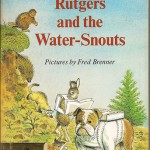 I didn’t find that bit of info out until much later, when our former next-door neighbor, who owned a book store in Rice Village, kindly ordered the book and gave it to me as a surprise after remembering me waxing on about it. I wasn’t expecting to be impressed by the book, but it’s really not bad. It is sort of a cross between Pooh and Wind in the Willows, but it lacks the insipid twee-ness of the former (I know, it’s sacrilege, but I despise that Pooh crap) and isn’t as boring as the latter. It’s not great by any means, but it’s well done, and I’ve enjoyed reading it to Thomas, who also enjoys it. It’s about a bulldog whose life has no meaning until he finds some watersnouts, and when the watersnouts are stolen he and his friends go looking for them and [spoiler!] find them in the possession of some ill porcupines.
I didn’t find that bit of info out until much later, when our former next-door neighbor, who owned a book store in Rice Village, kindly ordered the book and gave it to me as a surprise after remembering me waxing on about it. I wasn’t expecting to be impressed by the book, but it’s really not bad. It is sort of a cross between Pooh and Wind in the Willows, but it lacks the insipid twee-ness of the former (I know, it’s sacrilege, but I despise that Pooh crap) and isn’t as boring as the latter. It’s not great by any means, but it’s well done, and I’ve enjoyed reading it to Thomas, who also enjoys it. It’s about a bulldog whose life has no meaning until he finds some watersnouts, and when the watersnouts are stolen he and his friends go looking for them and [spoiler!] find them in the possession of some ill porcupines.
3. The Adventures of Tom Sawyer by Mark Twain. I kept this book continuously checked out of the Graham Public Library when I was eight, nine, ten years old. My grandmother and the librarian used to conspire against me to try to get me to check something else out; I’d just stand there hugging the book tighter to my chest, shaking my head (“You’ll take my Sawyer when you pry my cold, dead fingers . . . .”) It’s the first book I remember that aroused feelings of guilt, because after the first or second time I read it, I would always skip the chapter in which the bug crawls up the aisle in church, because I found it so so so boring. I knew you weren’t supposed to skip parts of books, so I always felt bad about it, but I just couldn’t bear reading that chapter. Now I’m a grownup and I skip and skim all the time and don’t feel the slightest bit guilty about it. I do wind-sprints with scissors and sit as close to the TV as I want. It’s great being a grownup. In Borders last year I found a reissue of the old Grosset and Dunlap edition of this book,the same edition I kept checking out, and bought it, though I knew (from revisiting the book in my mid-twenties) that it is most definitely a kids’ book and probably not even readable by most of today’s kids. As a side note, I kept wanting to read Huckleberry Finn, but the librarian told me I had to be X age before I could read it (junior high maybe? I can’t remember how old she said I had to be.) I later thought that was censorious and narrow-minded. Now I’m impressed that we had a librarian in our little town who knew the book well enough to know that it was controversial.
4. My Side of the Mountain by Jean Craighead George. 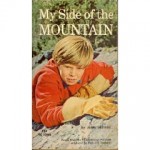 A kid named Sam Gribley from New York City decides to go find a patch of land that his family owns from many generations back and to live off the land. This book seemed so real to me I thought it was non-fiction, or maybe it was because the cover was a photograph of a boy. I have re-read it several times to Thomas, and he also loves it. It’s pretty flat-footed as far as style goes—the first-person narrator sounds less like a twelve-year-old boy than a twelve-year-old boy’s mom—but it’s still a very good and readable book. I used to try to make the “Indian fishhooks” Sam used. They don’t work. None of the living-off-the-land lore in that book is accurate, I’m sure, but it’s a good job of imagining on the author’s part. There are a couple of sequels to the book. If I read them I don’t remember them.
A kid named Sam Gribley from New York City decides to go find a patch of land that his family owns from many generations back and to live off the land. This book seemed so real to me I thought it was non-fiction, or maybe it was because the cover was a photograph of a boy. I have re-read it several times to Thomas, and he also loves it. It’s pretty flat-footed as far as style goes—the first-person narrator sounds less like a twelve-year-old boy than a twelve-year-old boy’s mom—but it’s still a very good and readable book. I used to try to make the “Indian fishhooks” Sam used. They don’t work. None of the living-off-the-land lore in that book is accurate, I’m sure, but it’s a good job of imagining on the author’s part. There are a couple of sequels to the book. If I read them I don’t remember them.
5. Moby Dick, or The Whale by Herman Melville. I guess Melville couldn’t decide on a title. I may be cheating a bit on including this one. I’m not sure I’ve read it six times. I know I haven’t read it completely through six successive times, but like Under the Volcano (below) it’s one of those books I’m always re-reading. I skip around, I start randomly at various places. I have never understood why it has a reputation for being boring. Middlemarch is boring. The first paragraph of Moby Dick—hell, the first sentence—ought to hook anybody. Granted, by the time you get to the chapter called “The Whiteness of the Whale” you might want to investigate the use of stimulants, but if you just accept that Melville is a lunatic genius bent on burrowing right into the mind of God you will probably cut him some slack and just go with it. Also what is overlooked is the humor of the book. I embarrassed myself cracking up in public (the Flightpath coffee shop in Austin) reading the comparison of Queequeg’s resemblance to George Washington.
6. The Great Gatsby by F. Scott Fitzgerald. Widely and rightfully regarded as a perfect book and, for some, the worthiest candidate for “the Great American Novel” (though I’d vote for Moby Dick.) I have big portions of this novel memorized (most of the first chapter and the last few pages.) Both Nick Carroway and Binx Bolling, narrator of The Moviegoer, turn thirty during the course of their respective books. I take that as evidence that people matured earlier in earlier generations, since forty was a much bigger watershed age for me than thirty was. That could just be me, of course. It probably is just me. I pull this book out frequently and think I’ll read just enough to persuade myself that it’s not as great as I remember, that it’s hackneyed, overly melodramatic and quaint, and more often than not I wind up reading the whole thing in one sitting and being amazed all over again by how beautiful and perfect it is.
7. The Moviegoer by Walker Percy. 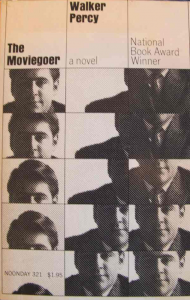 I first heard of this book when I was 21, when I went to hear Larry McMurtry speak at some UT presentation. He made a passing reference to it—I don’t remember what his point was in bringing it up, but I went out and got the book. I didn’t make it past the first few pages. About a year later I tried again and got sucked into the book in a way that hadn’t happened since Stuart Little and hasn’t happened since. I mean, it shook me up. I’ve read it many times since then, but I don’t read it anymore for fear that the next time it just won’t measure up. It’s set in New Orleans over Mardi Gras week and has only the barest of plots. Walker Percy is also known as the guy who discovered and wrote the foreword to John Kennedy O’Toole’s A Confederacy of Dunces, a book that is much beloved and which I have read three times because of its belovedness and which I have found each time to be stupid and not at all funny.
I first heard of this book when I was 21, when I went to hear Larry McMurtry speak at some UT presentation. He made a passing reference to it—I don’t remember what his point was in bringing it up, but I went out and got the book. I didn’t make it past the first few pages. About a year later I tried again and got sucked into the book in a way that hadn’t happened since Stuart Little and hasn’t happened since. I mean, it shook me up. I’ve read it many times since then, but I don’t read it anymore for fear that the next time it just won’t measure up. It’s set in New Orleans over Mardi Gras week and has only the barest of plots. Walker Percy is also known as the guy who discovered and wrote the foreword to John Kennedy O’Toole’s A Confederacy of Dunces, a book that is much beloved and which I have read three times because of its belovedness and which I have found each time to be stupid and not at all funny.
8. Jesus’ Son by Denis Johnson/The Watch by Rick Bass. I’m putting these two short story collections as one entry because they each had big roles in defining for me what was possible to accomplish in the short story. The Moviegoer did that for me for the novel, but The Moviegoer appealed to the reader in me more than the writer, as if those can be separated (they can). I felt like I’d already written The Moviegoer, or should have—rather I felt like I was in fact Binx Bolling. Bass showed me what could be done with sentences, and digressions, when I was 22 years old. The collection has not held up, and I’m inclined to be a little embarrassed by how fervent I was about it. I shouldn’t feel that way, though. It’s okay to change; you don’t have to disown everything that went before. “Thunder Road” just doesn’t do it for me anymore, either, not like when I was seventeen. Jesus’ Son came a few years later; I was 25 when I first read it. A line from the song “Quintana Lake,” which I posted a couple of weeks ago, came from the story “Work” in that collection, and I forgot to credit it. Johnson describes driving through Iowa as not moving, just getting smaller, which is just perfect. I still buy every book he writes as soon as I hear about it, even though nothing has had anything near the effect Jesus’ Son had on me.
9. Goodbye to a River by John Graves. This is the only non-fiction work on the list. In the late fifties Graves, having heard of plans to build a series of five dams on the Brazos River, decided to take a final canoe trip down the river he had grown up exploring. He put in below Possum Kingdom lake, which not at all coincidentally marks the edge of what I consider my own childhood territory, and floated for a couple of weeks down toward Granbury. 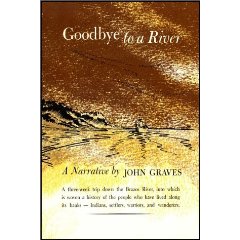 The result is an elegiac work that is equal parts travelogue, natural history, Indian and pioneer lore, memoir and meditation on time and mortality. It is hands-down the greatest work ever published by a Texan and the greatest work about Texas. Graves is still alive, still living up near Glen Rose. He is notoriously unprolific and nearing 90. His latest book, which I scooped up with great anticipation, Myself and Others, came out just four or five years ago and was hugely disappointing. It is a memoir of his life in Europe after a stint in the Marines after WWII, and it reads like a parody of Hemingway both in style and substance. I actually felt embarrassed for him while reading it. Everything else he published (rather, his other three books) is very worth reading multiple times.
The result is an elegiac work that is equal parts travelogue, natural history, Indian and pioneer lore, memoir and meditation on time and mortality. It is hands-down the greatest work ever published by a Texan and the greatest work about Texas. Graves is still alive, still living up near Glen Rose. He is notoriously unprolific and nearing 90. His latest book, which I scooped up with great anticipation, Myself and Others, came out just four or five years ago and was hugely disappointing. It is a memoir of his life in Europe after a stint in the Marines after WWII, and it reads like a parody of Hemingway both in style and substance. I actually felt embarrassed for him while reading it. Everything else he published (rather, his other three books) is very worth reading multiple times.
10. Under the Volcano by Malcolm Lowery. A hugely powerful and hugely difficult book, a North American Ulysses set in Mexico and written by a Canadian. You read it hoping this is as close to hell as you ever get. As mentioned above, I can’t read this one all the way through in a sitting anymore. If you’re interested in what alcoholism looks like up close but don’t really want to go there yourself, this is the book to read. No matter what, you know it had to be written.
Other things could go on this list, but that’s plenty. I doubt there will be any more books I read six times. That’s fine. I’ve read enough books six times.
Andrew Bird. Every now and then I’ll catch myself thinking, y’know, maybe . . . if I’d started earlier. . . if I’d done this or that or whatever. . . if I’d taken band in high school. . . or a dozen other scenarios. Then I run across a guy like this and it’s clear why I went to law school. There are people you just can’t imagine doing anything other than what they’re doing, and this guy is one of them. I saw him on Austin City Limits Saturday night, and from the first song he played (the one below) it was clear that no matter what else he might be qualifed to do, what he was doing was the only thing he could do. When you see that, it’s always mesmerizing (see Under the Volcano above).
4 Comments
This entry is filed under Uncategorized and tagged with Lego Town, Nutcracker Buck.
You can also follow any responses to this entry through the RSS 2.0 feed.
Or perhaps you're just looking for the trackback and/or the permalink.

Can you send me the lyrics to this? I love it!
I was at the wind power show in Chicago in the spring and at O’Hare Airport, they had this massive Lego display sponsored by Vestas, a leading turbine manufacturer. It was incredible – one was of the Statue of Liberty holding a turbine, one was of a desert scene, another a town, and another a forest, all showing the construction of turbines in those settings. The desert one had Lego camels lugging the parts … it was so intricate!
Sometime later, I walked out of my office building and parked on the street was a gigantic traveling Legos truck with every imaginable type of Lego persona silkscreened on the side. They were in town for some sort of children’s museum event.
My co-worker has pictures of all of these things – if they’re any good I’ll send you a few. But I want those lyrics!
duh – obviously the lyrics are posted prominently on your sidebar!
my sidebar isn’t on the side.
Mine ain’t prominent .